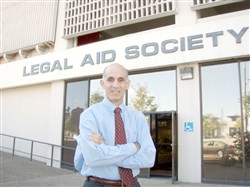VOL. 36 | NO. 12 | Friday, March 23, 2012
Hard times bump demand for pro bono legal work
By Joe Morris

Gary Housepian, executive director of the Legal Aid Society of Middle Tennessee and the Cumberlands, says many client problems are the ‘ripple effect from unemployment.’
-- SubmittedThe continuing economic slump and stagnant unemployment rate have meant a multi-year uptick in the number of people needing help with foreclosure, bankruptcy and other legal issues. And usually the lack of income that created the crisis means there’s no money to pay an attorney to help find a solution.
Enter the Legal Aid Society of Middle Tennessee and the Cumberlands, and the Nashville Pro Bono Program, which are seeing their highest caseloads in history.
In 2010, the Legal Aid Society provided assistance with 5,671 civil legal cases, while the Nashville Pro Bono Program and other pro bono efforts worked on 2,477 more. The 8,703 total cases represented a four percent jump over 2009, and 2011’s numbers look to be up even more, according to officials with both programs.
“Over the last three years we’ve seen an increase in the areas of collection, where people can’t pay their debt, and bankruptcy, where they need to protect their income and property,” says Lucinda Smith, director of the Nashville Pro Bono Program.
“We’ve seen those level off a little bit, especially in collections, but we still are dealing with a lot of issues resulting from unemployment.”
“While we have seen those increases, we also have seen our family-law numbers stay constant,” adds Gary Housepian, executive director of the Legal Aid Society. “We are still dealing with divorces, orders of protection and those matters, but also helping people through our statewide Tennessee Taxpayer Project.”
The tax program helped 392 low-income families to the tune of about $2.5 million in relief for 2010, Housepian says, a figure he says should climb in 2011, as well.
“We have the benefits work, like social security and TennCare, while the pro bono program works on predatory lending, mortgage scams, things like that,” Housepian says. “But all of it is a ripple effect from unemployment, and the rising debt and other things associated with it.”
The two entities have been operating together since 1987 when the Nashville Bar Association, which operated the pro bono program, realized along with Legal Aid officials that clients would be better served if the two shared office space. The bar association continues to support both programs with time and revenue, as does the Nashville Bar Foundation.
“They are tremendously supportive with funds, but the most important thing we get from the bar association are the lawyers themselves who help with the casework,” Housepian said. “As the demands on our staff have increased, we’ve had an exponential increase in lawyers helping our community.”
Last year 810 volunteer attorneys in the Nashville area pitched in, reporting 8,555 hours of work. At $200 an hour, that’s about $1.8 million in donations and more than $2.5 million in the last two years, Smith says.
“It really leverages what we can do,” she adds. “These lawyers are using their skills and talents to help people in poverty, and that’s a need that never really goes away.”
In recent years the pro bono program and Legal Aid have worked to further maximize those donated hours. They have worked with the larger firms to establish areas of focus, such as using attorneys from Stites & Harbison for unemployment cases, referring landlord-tenant issues to a group at Bass, Berry & Sims, and setting up a debt clinic through attorneys at Waller Lansden Dortch & Davis.
“We have a lot of different ways to identity a need, and now can get a specific group of lawyers on board to meet that need,” Smith says. “We can focus our resources much better.”
Even with maximum effectiveness, there’s only so much the two organizations can do, however, Housepian notes.
“Our resources do diminish in terms of staff attorneys,” he says. “We have to be very careful with our case selection. It’s a terrible dilemma. There are 75,000 to 80,000 people in Nashville who need help with a legal problem every year. That’s enough to fill the stadium at L.P. Field. Even working our smartest, there just aren’t enough legal resources out there.”
That said, both organizations say that by leveraging not only the pool of local attorneys, but also by pairing up with third parties, there’s still more that can be done. That now includes work with Catholic Charities to meet the needs of clients in the Hispanic community, as well as with Monroe Carell Jr. Children’s Hospital and the low-income families who come there, as well as other medical providers to help identify legal issues that affect health outcomes. And then there’s the partnership with the YWCA shelter to help women who are victims of domestic violence, as well as a new project, Hometown Support, which helps veterans and National Guard members with legal issues.
“We are working with these organizations to further our mission, which is to stabilize individuals and families so that they are safe and can rebuild their lives,” Housepian says. “When they are safe and whole, they are working, going to school and a functioning, successful part of society. That is what we work to see happen.”